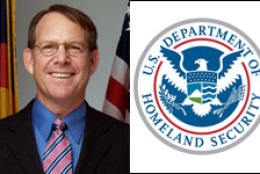Cybersecurity
-
How would the Pentagon change under Mitt Romney? And what would President Obama do to the Defense Department in a second term? Federal Drives talks to advisers to the two candidates about the different approaches to national security.
October 26, 2012 -
The Federal Drive with Tom Temin and Emily Kopp hosts a panel discussion on how industry and the government are working together on meeting their shared cybersecurity goals.
October 26, 2012 -
Pentagon makes one more plea for a resolution to sequestration. A regular budget, an annual authorization bill and a resolution to the fight over cybersecurity laws would be helpful as well.
October 26, 2012 -
Mark Weatherford, DHS deputy undersecretary for cybersecurity, discusses how the National Cybersecurity and Communications Integration Center is at the core of an effort to bring government and industry closer together to respond to threats against critical infrastructure. October 25, 2012
October 25, 2012 -
Identity management, standup of Cyber Command, and information sharing with the industrial base have been cited as key cyber accomplishments in the Department of Defense. But much work remains, experts say.
October 25, 2012 -
Federal News Radio polled current and former federal cybersecurity experts for their opinion on what were the most significant accomplishments since 2006 to secure federal networks and improve public-private partnerships. The list blends suggestions of more than 10 authorities on federal cybersecurity. The accomplishments are in no particular order.
October 25, 2012 -
From passing cyber legislation to training the future workforce to handle cyber threats, the federal government still has several important items on its cyber agenda.
October 25, 2012 -
A look at the events shaping cybersecurity policy in the federal government over the past six years.
October 24, 2012 -
Six years after the Veterans Affairs data breach, civilian agency networks and computers are more secure. Current and former federal officials and cyber experts say from secretaries on down, the threat of a cyber attack and the impact on mission is well understood.
October 24, 2012 -
Rep. Jim Langevin (D-R.I.), co-founder of the bipartisan Congressional Cybersecurity Caucus, says the U.S. is falling short when it comes to a skilled cyber workforce capable of operating at the highest levels of its field. His column is part of Federal News Radio's special report, Cybersecurity Rising.
October 24, 2012 -
Rep. Mac Thornberry (R-Texas), the chairman of the House GOP Cybersecurity Task Force, argues that the country's national security cannot afford a stalemate on cyber legislation. His column is part of Federal News Radio's special report, Cybersecurity Rising.
October 24, 2012 -
A group of experts released a white paper recommending changes to OMB Circular A-130. The suggestions center on continuous monitoring, the role of DHS in overseeing FISMA and the definitions of a major IT system and a national security system.
October 23, 2012 -
Federal News Radio polled current and former federal cybersecurity experts for their opinions on what were the most significant cybersecurity accomplishments since 2006 to secure federal networks and improve public- private partnerships. The accomplishments are in no particular order.
October 23, 2012 -
The draft solicitation asks for 15 toolsets and 11 service areas to help agencies implement continuous monitoring as-a-service and to buy sensors. DHS has asked vendors on GSA Schedule 70 to comment on the requirements.
October 22, 2012 -
Homeland Security Department Secretary Janet Napolitano approved the reorganization plan earlier this week. The newly aligned Office of Cybersecurity and Communications expands from three divisions and creates a new performance-management office.
October 19, 2012



